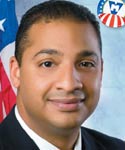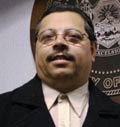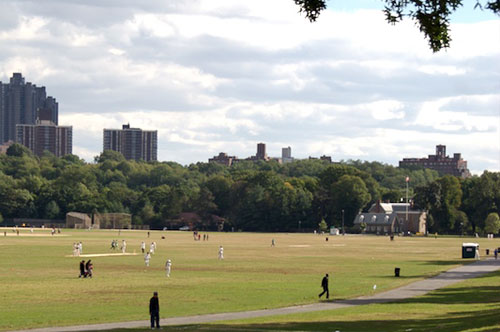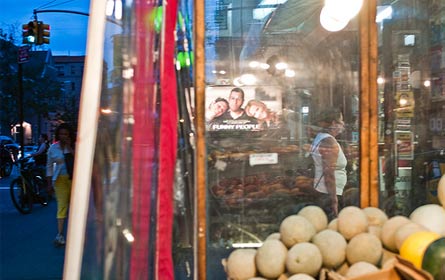Koppell Fights for a Third Term
A former attorney general, assembly member and two-term city councilmember made his way down from the 20th floor of a Waldo Avenue apartment building one step at a time.
On the way, he knocked on the doors of Riverdale's "good Democrats" -- the ones who vote in every primary, he said. Many of them -- or at least the ones who answered the door -- recognized him.
"I know who you are," said one resident. "I see you around," said another.
Oliver Koppell already has a record and a reputation in the 11th council district in the Bronx -- which stretches from Riverdale to Woodlawn. But is it one that Democrats want to keep for another four years?

Koppell, unlike most City Council incumbents, is facing a tough challenge. It comes from a former community board chair and attorney Tony Perez Cassino. Cassino, a North Riverdale resident, says Koppell is out of touch with the district. Riverdale is changing, Cassino argues, and residents need a new face to see them through the transition. Koppell counters: The district, which is far more suburban than urban, is great the way it is.
While Casino calls himself a change agent, Koppell says he wants to do exactly what he says he has been doing for eight years -- making Riverdale and its surrounding communities a better place to live.
Riverdale as Destination
While driving through the tree-lined streets of Fieldston -- the councilmember's home turf, characterized by single-family homes -- Koppell explained how he has worked to preserve his Northwest Bronx district.
"I am very proud of landmarking Fieldston," Koppell said. "That's going to keep it like this presumably forever."
During his council tenure, he steered through the landmarking of the neighborhood, and worked to rezone Wakefield, Riverdale, North Riverdale and Woodlawn -- all an attempt to preserve the character of the communities.
"I don't want to see Riverdale become Paramus, N.J., and if people want to have a wide variety of department stores where they can buy fancy designer dresses, they can go to Paramus," said Koppell. Koppell says the people of district 11 do not want to see the area change or be the site of large-scale residential development.
This may be the largest difference between Koppell and his competitor. Cassino, who has lived in Riverdale for 16 years and grew up in Bedford Park, says young families are leaving the district because they don't have enough entertainment and family-friendly options.
"They want a community that is vibrant," said Cassino at a recent debate. "There aren't enough things that will keep them for the long term. That refers to the schools, that refers to the shopping districts, that refers to the family friendly options, and what we hear over and over again is we need to do a better job."
Cassino, who has spent his law career working on and coordinating pro bono cases, wants to bring a wide range of small businesses to the smaller neighborhood of Riverdale and larger, chain stores throughout the rest of the district. Restaurants, small shops and larger stores along Broadway, he says, will help keep residents from moving out.
To attract residents, Cassino is looking at the area's school system as well. If elected, within his first 30 days, Cassino said he would set up a task force at a local middle school of parents, educators and other stakeholders to come up with a detailed plan on how to improve the area's schools.
Although Koppell disputes Cassino's claim that residents are leaving Riverdale en masse, the council member does agree that schools must continue to improve. He says he has already brought two new schools to the area, and if re-elected he would continue to push for more seats.
Term Limits Bites Back
Cassino had just finished his appearance on Bronxnet -- the area's public access channel -- where he had slammed the incumbent for championing the City Council's and the Bloomberg administration's extension of term limits.
"We're not getting the representation we should be," said Cassino, who was dressed in khakis and a blue blazer. "Twenty years ago, (Koppell) would never have voted for term limits."
Koppell didn't just vote for it either. A year before the City Council voted to extend term limits from two to three terms, giving Koppell and the other 38 term-limited members an opportunity to seek four more years in office, Koppell introduced legislation that was nearly identical to the bill the council approved. Just a few weeks before the approval last year, he introduced another bill urging the city to give elected officials another term via referendum.
Koppell's explanation: He has been and, he says, always will be against term limits.
"If my constituents want to vote against me because I voted to extend term limits, of course they have the right to do so, but I have never believed in term limits," said Koppell.
Cassino, though, is trying to capitalize on the move, sending out mailing that attacks Koppell for approving the extension. When asked what the first thing he would do as a councilmember, Cassino said he would introduce a bill that would roll back the extension.
A Mixed Record
Cassino also attacks Koppell's ability to govern overall, claiming the lifelong politician has had his run and should be put out to pasture.

As an example, Cassino cites the City Council's approval of the wastewater treatment plant in the district's largest green space: Van Cortland Park. Koppell vehemently opposed the controversial project, which is vastly over budget and currently under construction, but lost the battle to relocate the facility to Westchester County.
"It shows the weakness that he has as legislator," Cassino said. "They put it in his district and he was powerless to stop it." Cassino also did not want the treatment plant in the park and sat on a monitoring committee at the time to try to minimize the project's impact on the community.
Cassino also criticizes Koppell for not doing enough to boost the district's transit access. Koppell says the district's transportation is "excellent," and he has been pushing for ferry service.
Recently, Koppell has been firing back, accusing Cassino of taking campaign funding from developers, including one that built a controversial development in the area called Villanova Heights.
Where Support Lies
For the most part, Koppell has landed the backing of all of the Bronx's most powerful groups, including the Bronx Democratic Party, the city's largest municipal workers union, DC 37, the United Federation of Teachers, the Police Benevolent Association and the New York Times.
Even though Cassino has garnered the endorsements of labor powerhouse SEIU 1199 and good government group Citizens Union, the sister organization to Gotham Gazette's publisher, Koppell isn't sweating the race too much -- at least not noticeably.
Having knocked on dozens of doors in Riverdale last week, Koppell decided to call it quits, despite the suggestion from a friend and volunteer to visit voters at a building where he used to live. If he had to knock doors there, Koppell said, he would really be in trouble.
"And I am not," he said.
Racing to Represent Long Island City
First there were five, including a VH1 reality television star who boasted about his candidacy on YouTube.
Then there were four, including a conservative Democrat who wanted to give vouchers for religious students to attend private schools.
Now, only three candidates are facing off to represent district 26, which covers Long Island City, Sunnyside, Woodside and Maspeth in Queens. This contest stars Democratic party-backed Deirdre Feerick, who is already inside City Hall as deputy director of the City Council's administrative services division; James Van Bramer, who has won the endorsement of the powerful Working Families Party and is the chief lobbyist for the Queens Public Library; and Brent O'Leary, a legal counsel for Bloomberg LP who casts himself as the "only grassroots candidate."
Like many races in the surrounding area, development, education and the floundering economy have taken center stage. But as these candidates duel over whom will replace Councilmember Eric Gioia, who is vacating the seat to run for public advocate, politics has also been thrust into the limelight.
Van Bramer's ties to the Working Families Party have been criticized, while Feerick has been chastised for challenging the petitions of two former candidates who were knocked off the ballot. Meanwhile, O'Leary hopes to use this politicking to his advantage.
Developing the Queens Waterfront
What was once an area of of factories and industry is now spattered with high-rise condominiums and the Citibank Building. As the community rapidly gentrifies, some residents who claim over such projects have changed the district's character, caused rents to rise and failed to produce the kind of environment that developers promised.
These candidates are now grappling with how the city should deal with development moving forward and what to do about vacant or stalled projects that fell victim to the financial meltdown.
They all agree that developers need to acknowledge the resident's concerns before starting construction and that future projects must include space for schools and parks. They also all agree the district should have a mix of development -- from residential to commercial -- as long as it fits with the character of the community.
"The real crisis is that we're losing affordable units in the buildings that already exist." said Van Bramer, a man with salt and pepper hair who goes by "Jimmy." Van Bramer, who was endorsed by Tenants Political Action Committee and the League of Conservation Voters, charged that huge conglomerates buy up existing buildings and force tenants out by increasing the rent.
Van Bramer wants rent stabilization laws strengthened to protect current residents. In a possible reflection of his current job, he also insists that public libraries be included in areas like Hunters Point South, a large mixed-use development proposed for the district.
O'Leary sees development as an opportunity to spur affordable housing and "put a lot of construction workers and electricians to work, at the same time bring everyone's rent down." O'Leary says the city should "buy up" the vacant properties and turn them into affordable housing. If elected, he has also promised to post all of his conversations with lobbyists, including developers on the web along with development updates online, an effort he says will boost transparency.
Feerick, who has the most backing from Queens politicians including Gioia, calls stalled developments "silent sites." She also wants to turn them into affordable housing and said that, in their current state, they are unsecured and so provide opportunity for criminal activity..
She also said developers need to speak with current residents before they start building and that the city should provide the public with comprehensive information on development in their communities. "You shouldn't have to have a MBA in public administration to understand zoning laws," she said.
All the candidates support inclusionary zoning, which offers incentives for developers to include affordable housing in new developments. On top of that, they want to hold developers accountable for keeping rents low and setting aside the agreed upon number of homes.
On The Issues
As of July, Queens' storefront vacancy rate had reached 7 to 10 percent and was projected to go up to between 12 to 15 percent by the end of 2009.
While there is little a councilmember can do to fix the overall economic downturn, they did offer some ideas on how to lessen its impact.
O'Leary, who says his experience in international business is proof he is not connected to a "dysfunctional government system" like his opponents, has made economic development the linchpin of his campaign. Under his platform of "giving us a voice in our own community," he calls for monthly town hall meetings where small business owners and residents could meet with their City Council representative and voice their concerns.
O'Leary said he will try to put job placement centers in the district and would seek to bring down the cost of living in the neighborhood, starting with the cost of the subway. Even though the Metropolitan Transportation Authority is a state agency beyond the City Council's jurisdiction, O'Leary said he would lobby for merit-based pay for the authority's executives. If the fares go up, he adds, executives should get a pay cut.
The overall goal of Feerick's campaign, she says, is to "make sure people have a safe supportive place to live and a safe supportive place for our children." As someone who has already worked at the City Council, Feerick says she will be able to start working for the district from day one.
Van Bramer, who has garnered the endorsement of some of the city's most powerful labor groups, like SEIU 1199, said if elected he would work to reduce class size and add afterschool programs, decrease truck noise and reduce graffiti.
"To me being a City Council member isn't about grabbing headlines or cozying up to political bosses," Van Bramer said on the city's video voter guide. "As a lifelong Democrat, I know that its about doing one thing: working for all of us."
Both Van Bramer, who has raised $75,956 in private funds and received $84,122 in matching funds, and O'Leary, who has gleaned $42,734 in private funds and $37,751 in public funds, have pledged to not take donations from developers. Feerick, who has not made a similar pledge, has raised $74,935 privately and $84,122 in public funds.
Going Negative
Van Bramer may be a lifelong Democrat, but it's his connection with the Working Families Party that is bruising now. He is one of six City Council hopefuls whose expenditures are being eyed by the city's Campaign Finance Board after they contracted with the party's private consulting group, Data and Field Services.
The board has questioned whether candidates who received the party's endorsement and subsequently contracted with its private consulting firm are paying market rate for the firm's services. Feerick has filed a formal complaint against Van Bramer with the Campaign Finance Board .
On the other hand, both O'Leary and Van Bramer have fiercely criticized Feerick for filing objections to candidates' petitions with the city's Board of Elections. The challenges got the cintenders kicked off the ballot. Feerick defended her effort, saying election rules need to apply to everyone.
"We're not talking about clerical errors here," said Feerick. "We're talking about number of Democratic voters."
In this Democratic leaning district, the winner of the Sept. 15 primary is likely to cruise through the general election and into office next year. The primary winner will face Republican Angelo Maragos i November.
Drumming Up Support in the Heights

If you want to get elected in Washington Heights, start by getting a car.
Paste posters of your face all over it. Blasting merengue from a large roof-mounted megaphone can't hurt either. Then hit the streets. Knock on doors. Shake hands.
These are just some of the tactics employed by the eight candidates vying to represent the City Council's 10th district -- which stretches from Manhattan's Washington Heights to the Bronx's Marble Hill. All Democrats, the winner of the Sept. 15 primary election will face minimal opposition from a third party candidate, Judith Amaro, in the general election this fall.
Because of the resignation last month of Councilmember Miguel Martinez, the first casualty of the City Council's slush fund scandal, and the subsequent disqualification of the former councilmember who was trying to take his place on the ballot, Guillermo Linares, the race for district 10 provides a rare opportunity in New York City politics: It's an in for a political newcomer.
Those novices include first-time candidates and perennial petitioners. Three are teachers, three are city employees, one touts his experience as an architect, another extols his reputation as an attorney.
An Outsider Turned Inside Out

If anyone had an incumbent's advantage it would be Ydanis Rodriguez. With the most nods from the city's political elite, including Upper Manhattan's Assemblymember Adriano Espaillat and the Working Families Party, Rodriguez is eyed by most of his opponents as the man to beat.
Rodriguez's campaign coffers are the largest: with $72,104 in private contributions $84,122 in public funds.
A social studies teacher and community activist, Rodriguez, who ran for the seat in 2001, has already adopted a popular New York political mantra: boost affordable housing and early childhood education.
"We have to defend affordable housing and defend tenants harassed by landlords," said Rodriguez just outside of the Dyckman Express Restaurant in Inwood moments before meeting a local housing organizer (Four passersby walked up during our interview to shake his hand.) "The budget is $60 billion. The question is where we set our priorities."
The lanky, towering candidate has set his: getting a tenants association in every development, bringing a public health clinic to the district and unifying the long-fragmented community.

Those goals, while not identical, are similar to one of Rodriguez's competitors: Manny Velazquez, a teacher and dean of students and chair of Community Board 12. Comparing his run against party-backed Rodriguez to David and Goliath, Velazquez says he wants to create a "bona-fide community center" in the district to offer services spanning youth to seniors.
"I'm not supported by the political machinery," said Velazquez, dressed in a dark suit and crisp white dress shirt, perched in a Dyckman Street grill's backlit booth. "I am supported by the community."
Also on this 32-year district resident's to-do list: requiring the City Council appoint the members of the Rent Guidelines Board instead of the mayor. He would have to go to Albany to enact such a proposal.
With a district where only 4 percent of residents own their homes, , Velazquez, who has raised $21,805 for his bid, said he wants to give incentives to developers to build affordable units in Upper Manhattan. "Once you own a home, you value your community," he said.
On the Fringe

Even though Velazquez casts himself as a political outsider, other candidates take that approach a step further, none more so than Ruben Dario Vargas -- an employee of the New York City Police Department, who refused to specify his position. (He also refused to tell Gotham Gazette his age.)
Standing in front of the city's Board of Elections on Tuesday, Vargas was ready to make a last-ditch attempt to knock his biggest rival off the ballot. After taking off his signature wide-brimmed black hat, Vargas stood at one of two podiums at the center of the room, charging that Rodriguez was not a registered Democrat.
Just two minutes later, the case was dismissed. Vargas said he lost his argument because Rodriguez is now a member of the political establishment and therefore can't get thrown off the ballot.
According to the city Board of Elections, Rodriguez has been a registered Democrat since at least 2000.
Vargas, who came to New York from the Dominican Republic 24 years ago and would later serve in the Air Force and the Navy, ran against Rep. Charles Rangel in 1996, and for City Council in 2001 and 2005.
Even though his dealings at the Board of Elections minutes beforehand might indicate the contrary, Vargas said he keeps running for office to ensure there is a democratic process in district 10.
"When elected officials are not opposed, they will take the people for granted," said Vargas. "I want goodness, fairness, wellness."
He has raised $12,190 and received $52,810 in public funding.
Vargas, who does not live in the district but has promised to move there by Election Day, says if he is elected he wants to require all schools have uniforms -- a policy he says would prevent students from discriminating against one another and doing drugs. He wants to make sure two of the district's subway stations, one on Broadway the other on Dyckman, get elevators, and he will work to stop excessive ticketing on area businesses.
Businesses have also made it onto the agenda of other district 10 candidates, including architect Luis Facundo.

"We should have banks. We should have hotels. We should have residential buildings," said Facundo, who is the vice president of the Chamber of Commerce for Inwood and Marble Hill and a salt-and-pepper haired native Dominican. One of Facundo's first priorities is to bring the real estate industry up to Upper Manhattan. He said, if elected, he would sit down and talk to developers and mandate a new formula for affordable housing: 15 percent of a development would be for low-income, 15 percent would be set aside for the "working class" and the rest would be set by the market.
Facundo, who refuses to participate in the city's public financing system but has raised $16,062 for his campaign, also wants to open the district's schools at night to get kids off of the street.
Other than that, he said, he's running a low-key campaign. "Elect Facundo, because he has the loudest merengue," he said in his campaign office, then laughed.
Rounding Out the Pack
Though some of these candidates have run for office multiple times before, others are taking their first stab at it.

Cleofis Sarete is one of them.
Dressed in a pink shirt that matched her lipstick, this English as a second language teacher sat in a local café and explained how she whetted her political appetite in college in student government. Since then, she has served as a local district leader and on an area precinct community council.
"As a parent, as a woman, as a community activist, I've been through the struggles that an ordinary citizen in this district has been through," said Sarete, who has raised $5,706 for her campaign.
She said she would "first and foremost" focus on education as a councilmember, including getting smaller class sizes.

The only other woman in the race is Francesca Castellanos, a Spanish language interpreter who works in senior and social services agencies. Castellanos, who has raised $6,872 and received $30,677 in public funding, ran against Martinez in 2001 and ran for the State Assembly in 2006.
Castellanos wants to focus on preserving affordable housing in the district by creating a city-based section 8 housing voucher program and by increasing rent subsidies for seniors.
"As a regular citizen, I have always worked for social service agencies," said Castellanos. "I have always helped seniors, tenants with their rents. I have been in the trenches with them."
Castellanos says she's running a grassroots campaign, which includes knocking on doors.
Richard Realmuto, the district's only non-Latino candidate, is taking his conservative Democratic philosophy to the road via U-Haul.

"I have a truck, I'm hooking up a U-Haul to it, we’ve got some music and I'm going to tour Marble Hill, Inwood and Washington Heights day and night," said Realmuto, who has raised $5,665 for his bid. "I'm just going to walk around, shake hands, maybe bring some ice pops," Realmuto added, laughing.
Realmuto, an attorney, wants to make sure the city government can provide a safety net, but not "a blanket." He'll staff his council office with lawyers, and try to bring job opportunity to the district. He wants a Barnes and Noble, charter schools and economic competition, which, he said, the district doesn't have.

Francisco Spies, a caseworker at the Human Resources Administration who is using between $100 and $200 from every paycheck to finance his run, has already beaten Realmuto to the road. He is cruising the streets of District 10 in a large van, blaring a song with a "Francisco Spies" refrain.
Spies wants to limit how much money people can spend on campaigns, require commissioners at the Board of Elections be elected and create a vocational school to boost job opportunities for local residents.
"The democratic system needs a tune up," he said. "Regular people are not truly represented."
These candidates want to be the "regular person" who will do just that.








